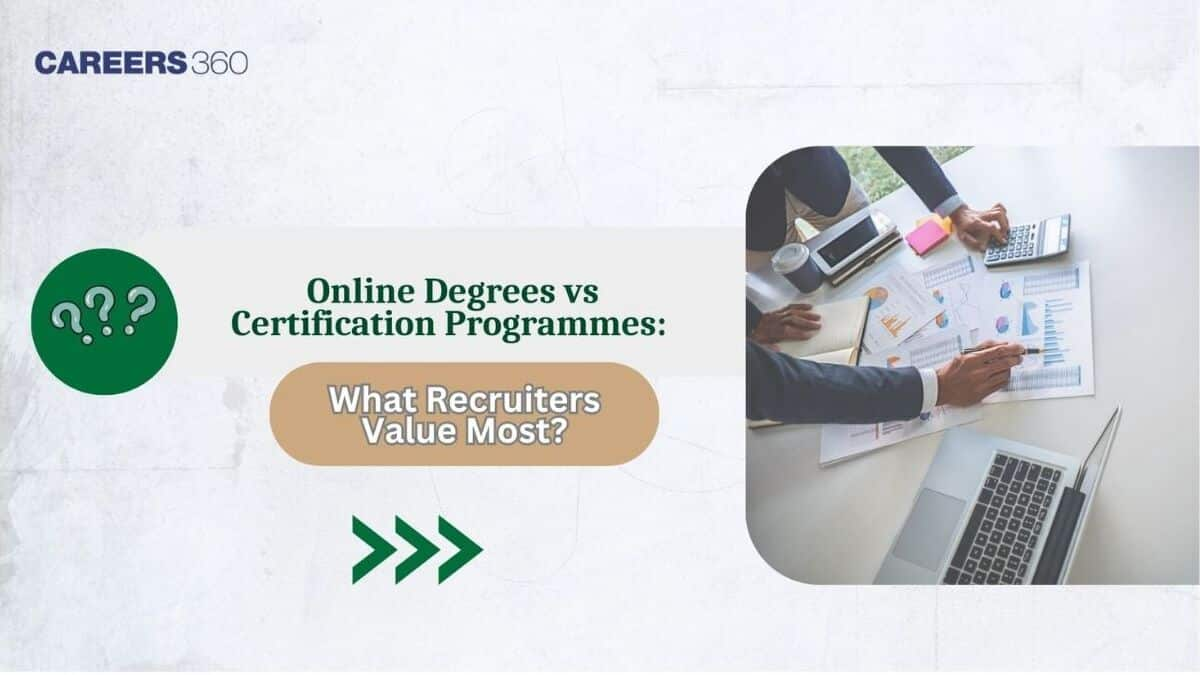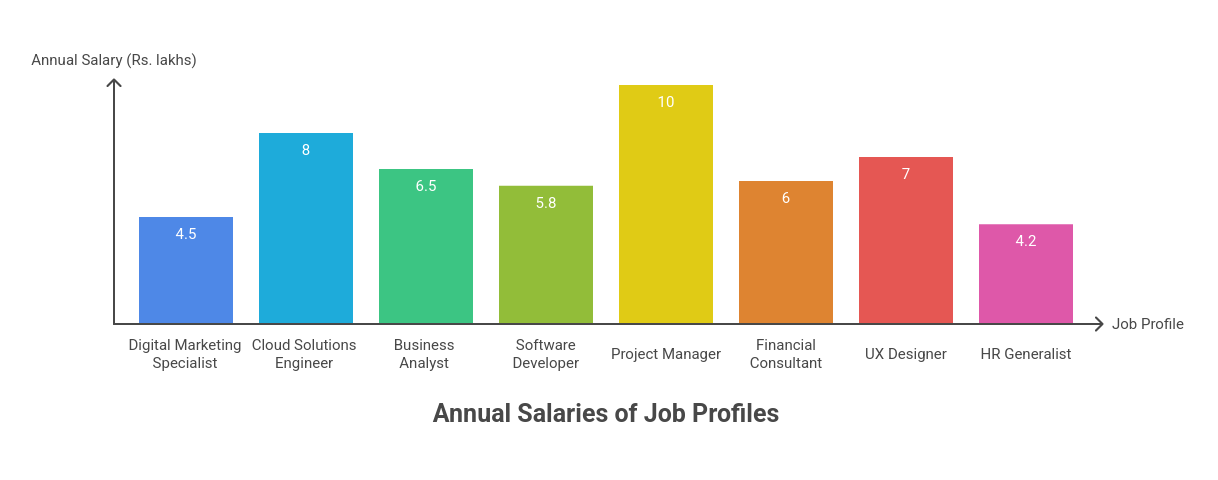K J Somaiya Institute of Management MBA Admissions 2026
Highest Package 27.25 LPA | Top 100 Average package 16.65 LPA | AACSB Accredited | Ranked 52 by QS International
Choosing between an online degree and a certification programme is a common dilemma for job seekers. As industries evolve, recruiters are changing the way they evaluate candidates. Today, practical skills and project experience often carry more weight than academic titles. It is no longer about what you have studied, but what you can deliver.
This Story also Contains

While online degree courses offer comprehensive knowledge, structured learning and credibility, certification programmes provide targeted skills and greater upskilling in specific areas. While recruiters value a combination of both skills, the total years of experience are mandatory in any emerging industry.
Choosing between an online degree and a certification programme is a common challenge for job seekers. Recruiters nowadays increasingly prioritise practical skills, experience, and results over academic degrees. The following points below mention what recruiters really prefer in the present scenario:
Highest Package 27.25 LPA | Top 100 Average package 16.65 LPA | AACSB Accredited | Ranked 52 by QS International
Highest CTC 30 LPA | #9 in Management Category by Times B-School | Merit-Based Scholarship Upto - 50 Crores
Many companies are shifting to skills-based hiring. They are no longer prioritising long academic credentials. Instead, they focus on how well a candidate can apply their knowledge.
Recruiters assess whether you have practical skills that match the job profile. For example, a working professional who has completed live projects or internships is often preferred over a degree holder with no real-world experience. This makes online certification programmes more relevant for specific roles, especially in technology and data-driven industries.
While certifications are gaining popularity, online degrees still hold strong value when issued by reputable and accredited universities. A candidate with an online MBA from a recognised university will be considered for managerial roles, especially if the curriculum includes industry-specific case studies and practical exposure.
However, recruiters are cautious of degrees offered by unknown or unaccredited institutions. Therefore, it is important to check for university affiliation, national accreditation, and industry relevance before enrolling in any online degree programme.
Online certification programmes are designed to deliver targeted skills in a short time, making them ideal for working professionals or recent graduates seeking specialisation in a specific field. Courses in areas such as cloud computing, digital marketing, data analytics, and project management are particularly in demand.
Recruiters value certifications from trusted providers as proof that candidates are current with industry trends and technologies. Many recruitment software systems scan for keywords related to certifications, making it easier for certified candidates to clear the initial shortlisting stages.
A powerful strategy is to combine an online degree with a few specialised certifications. This approach provides both theoretical knowledge and practical expertise, while also demonstrating a strong commitment to continuous learning. Candidates who complement their degrees with targeted certifications often stand out to recruiters and employers.
For example, a professional with an online BBA degree and certifications in Google Ads and CRM tools is more attractive in marketing roles than someone with only one of these credentials.
Also Read: Cost of Online Degrees: Do They Offer Better Value For Students?
With the growing popularity of online learning, job seekers often face a dilemma when it comes to which mode of learning to choose. While both options have their own benefits, understanding which to choose helps students maximise employability and skill development:
Choose Online Degrees If:
Choose Certification Programmes If:
In addition to degrees and certifications, recruiters look at the following skills:
Also Read: Tech Layoffs, the Looming Job Crisis, and New-Age Courses & Skills
Online degrees and certifications are completely different study formats. The table below showcases the key recruiter focus of these two degree formats:
| Credential Type | Recruiter Focus | Ideal For | Duration |
|---|---|---|---|
Online Degree | Structured learning, depth, accreditation | Career changers and freshers | 2 to 4 years |
Online Certification | Specialised, job-ready skills | Skill enhancement or quick role transition | 3 to 6 months |
Degree + Certification | Balanced approach, strong portfolio, long-term edge | Mid-level professionals aiming for leadership | Varies |
Job roles vary depending on your learning path. The image below mentions the career and salary details in both these study formats:

Source: Glassdoor
Online degrees and online certification programmes both have unique value in the job market. However, recruiters increasingly focus on the demonstrable expertise, a balanced approach, combining accredited with relevant certifications along with real-time experience, as they offer a stronger advantage in long-term career growth.
Frequently Asked Questions (FAQs)
Industries such as information technology, marketing, design and emerging tech roles place more emphasis on certifications and project-based skills.
Yes, students can pursue both degree and certifications together as many working professionals and students follow a hybrid learning path to maximise employability and long-term career growth.
Online certifications usually take 3 to 6 months, while online degrees may take 2 to 4 years to complete.
Recruiters do value online degrees if the programme is from a UGC-accredited and recognised institution.
Yes, especially in fields such as software development, digital marketing and cloud computing. However, the job level may be entry to mid-tier.
On Question asked by student community
There are several cheapest online MBA options like:
Visit the links for more details :
Anyone who has completed a bachelor's degree is eligible for Online MBA . For some online MBA courses, especially for Executive MBA, you will require at least 2-3 years of relevant work experience and sometimes a valid CAT, MAT, or GMAT score.
For more, read Online MBA Admission: Eligibility, Selection
Yes, an online MBA degree is UGC-recognised which making it highly relevant in 2026. It holds the same value and credibility as a on-campus programme. Due to its flexible nature, working professionals and graduates prefer an MBA in online, flexible mode to upskill themselves while working.
The Jain Entrance Test (JET) 2026 for MBA admissions at Jain University is a multi-stage process designed to evaluate candidates' aptitude, communication skills, and subject knowledge. The written exam syllabus typically includes sections on Mathematical Skills, Data Interpretation, Logical Reasoning, Language Comprehension, and General Knowledge. After the written test, qualifying
Hello,
Yes, after completing a bachelor’s in pharmacy, you are fully eligible to appear for the MAH MBA/MMS CET exam.
For Eligibility Criteria for MAH MBA/MMS CET 2026 you can access mentioned link below:
https://bschool.careers360.com/exams/mah-mba-cet
Hope it helps.
Ranked among top 10 B-Schools in India by multiple publications | Top Recruiters-Google, MicKinsey, Amazon, BCG & many more.
Among top 100 Universities Globally in the Times Higher Education (THE) Interdisciplinary Science Rankings 2026
Last Date to Apply: 10th Feb | Globally Recognized by AACSB (US) & AMBA (UK) | 17.8 LPA Avg. CTC for PGPM 2025
Applications Deadline - 23rd March 2026 | Offers full-time PGP in International Master in business (IMB) Equivalent to MBA under following specializations Marketing, HR, Operations, and many more
Ranked as the 3rd Best Private University in Gujarat by Education World
Highest CTC 24 LPA | Average CTC 8.5 LPA | 1600+ Recruiters | 165+ Corporates Linkages